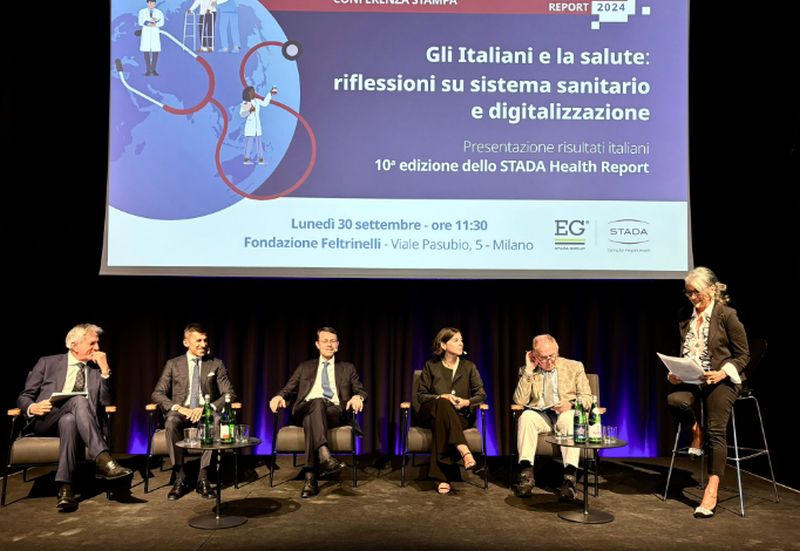MILAN (ITALPRESS) – More than half of Italians (52 percent) are dissatisfied with the National Health System: a dissatisfaction linked mainly to the difficulty of accessing medical visits, but one that does not call into question trust in health care providers. And although our compatriots are in favor of the digitization process that is affecting the medical sector, more than 4 out of 10 citizens are calling for an improvement in the relational aspect of health care.These, in a nutshell, are some of the insights that emerged from the 10th edition of the STADA Health Report, a comprehensive online survey conducted by Human8 on behalf of the STADA Group among a sample of 46,000 citizens in 23 countries, including Italy. The results for our country were presented today at a press conference in Milan, in the presence of representatives from the medical, pharmaceutical, and Cittadinanzattiva worlds.In detail, Italians’ satisfaction with the Health Care System continues to decline, falling from 69 percent in the 2021 edition of the STADA Health Report to 48 percent this year. For the majority of respondents (70 percent), the main cause of this negative trend can be attributed to the difficulty of obtaining an appointment to make a medical examination, while 31 percent of the sample complains about inadequate standards of care and 20 percent cite the lack of access to prevention services, especially in southern Italian regions.And it is precisely on the topic of “prevention” that another worrying fact is recorded: almost 6 out of 10 Italians (59 percent) do not undergo screening and checkups, still detecting a lack of sensitivity on the subject, as already emerged in last year’s edition.While, however, the level of dissatisfaction with the Health Service continues to increase, this discontent does not undermine the trust Italians place in conventional medicine – higher than the European average (77% vs. 69%) – recognizing in the competence of doctors and pharmacists one of the main factors of reliability.More than 80 percent of the sample uses digital platforms or sources on the Internet to retrieve health-related information, first and foremost “Dr. Google” (59 percent), followed by online articles (35 percent), websites of health institutions or pharmaceutical companies (19 percent) or influencers (17 percent).But as much as there is an openness on the part of respondents for the use of Artificial Intelligence to support healthcare providers (31%) and in general toward digitization-from electronic medical records (60%) to electronic package inserts (41%) to apps (35%)-Italians call for more attention to the human and relational component of care (over 40%) and a holistic approach to care (36%), which takes into account both the physical and mental health of the patient.Mental health is another of the issues the STADA Health Report focused on. More than 1 in 2 Italians (57%) suffer from loneliness (as opposed to 52% of Europeans) and 20% from burnout: issues that mainly affect women and those under 35. Young people are also those who complain most about the impact that loneliness has on their quality of life.Among the proposals put forward to alleviate this state of malaise are a better work life balance for younger groups and more changes in society-such as, for example, economic improvements, support for the elderly, access to leisure facilities-for women.”We are thrilled to have collaborated again this year with the STADA Group to produce the new edition of the STADA Health Report, which allowed us to paint a picture of Italians’ opinion about macro health and healthcare issues,” says Elena Madonia, Research Manager at Human8. “The results that emerged are of great relevance: the negative trend regarding the degree of satisfaction of citizens with the health care system continues, confirming above all difficulties in accessing medical visits. Nonetheless, Italians continue to place their trust in conventional medicine and healthcare professionals. On the other hand, with regard to the issue of ‘mental health,’ women and younger people are the categories that suffer most from loneliness and episodes of burnout. Our hope is that the data from this new research can help the Company to gain a deeper understanding of the health needs of the population in order to pursue its mission, ‘Caring for Peoplès Health. “The STADA Health Report is a valuable tool that allows us to get a clear and in-depth view of the challenges and opportunities of our National Health System, offering interesting insights about the main concerns and needs of Italians in the health field,” concludes Salvatore Butti, General Manager & Managing Director of EG STADA Group. “The results that have emerged provide data and reflections that can stimulate constructive discussion among all stakeholders in the sector in order to work together for a single goal, a more accessible and innovative future of healthcare. The Report also shows how Italians increasingly demand a “patient care” approach, which highlights the human side of health care, emphasizing the need to enhance the relational aspect in care, an element that, in an increasingly digitized context, turns out to be an essential pillar to ensure the overall well-being of people. And it is precisely on the concept of “caring” that EG STADA’s purpose is based, “Taking Care of People’s Health as a Partner of Trust.”””-photo xh7 Italpress-(ITALPRESS).

